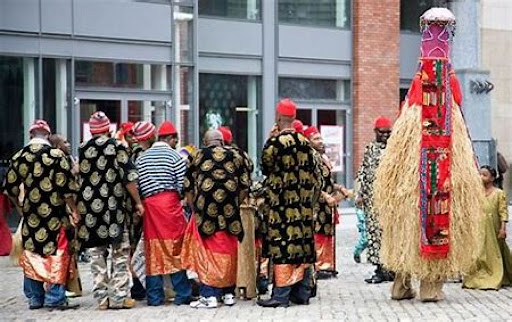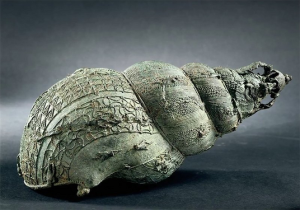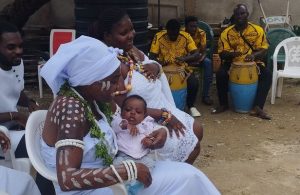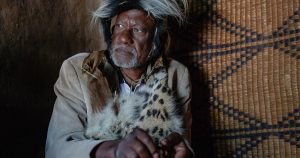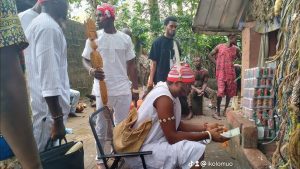A significant and active feature of Igbo cultural legacy are masquerades, called Mmanwu in Igbo language. Deeply ingrained in the spiritual, social, and cultural lives of the Igbo people from southeast Nigeria are they Considered as both a religious and social institution, Mmanwu represents the beliefs, values, and history of the Igbo people, therefore bridging the physical and spiritual worlds. Believed to represent the expression of ancestral spirits and deities, these masked figures are crucial to many Igboland celebrations, ceremonies, and rites.
Historical and Spiritual Significance
Masquerades originated in Igbo society from the old religious customs of the Igbo people, where they were seen as the live presence of the ancestors. The Igbo believe that life continues after death and that ancestors are very important in terms of protection, direction, and well-being of their offspring. By means of the masquerades, the souls of these ancestors are said to resurfaced in the earthly domain, where they engage with the live.
Moreover seen as the representation of gods and other supernatural creatures are masquerades. Usually connected with a certain god, spirit, or ancestor, every disguise has a unique identity and purpose within the society. Often known as Dibia or priests, the guardians of these customs guarantee the purity and authenticity of the performances, hence the rituals surrounding the masquerades are meticulously kept and handed down through generations.

Types of Masquerades
Igboland has many masquerades, each with unique symbolism, look, and goal in mind. The masquerades fall generally into the following categories:
- Ancestral Masquerades (Nne Mmanwu)
These masquerades are said to bless, protect, and punish members of the society as they reflect the souls of ancestors. Often called upon at celebrations, funerals, and rites of passage, they provide spiritual direction and guarantee the continuity of cultural traditions.
- Warrior Masquerades
Warrior masquerades, including the Okoroshi or Ojionu, are ferocious and frightening characters connected with the protection of the society. Often showing aggressive postures and weaponry, these masquerades represent their function as defenders against bad spirits, adversaries, and other hazards to the society. Their demonstrations of power, agility, and fighting skill define their presentations.
- Entertainment Masquerades
Less serious in character, entertainment masquerades are mostly carried out for fun and social events. Among the examples are the Atilogwu and Adanma masquerades, which are renowned for their colorful costumes, acrobatic dances, and lighthearted pranks. Often performing at festivities like festivals, weddings, and other events, these masquerades make the audience happy and funny.
- Ritual Masquerades
Ritual masquerades participate in certain religious or spiritual rites such the Ekpe and Owu masquerades. Often connected with secret organizations or religious cults, these masquerades are crucial in rituals connected with fertility, harvest, and initiation ceremonies. Their acts are rather ceremonial and usually limited to active members of the society.
- Social Control Masquerades
Social control masquerades—like the Agaba or Adamma masquerades—are used to uphold communal discipline and social standards. These masquerades punish offenders and uphold society ideals, therefore serving as the moral conscience of the community. Usually unexpected, their presence cause anxiety to individuals who act immorally or in antisocially.

Costumes and Masks
Masquerades’ identity is much enhanced by the symbolic significance of their costumes and masks, which are fundamental elements. Often constructed from wood, cloth, leather, and raffia, the masks are finely crafted to represent the character and purpose of the masquerade. The costumes could have flowing robes, ornate headdresses, and other accessories meant to accentuate the masquerade’s look and vibe.
Every masquerade mask and costume is painstakingly created to capture the attitude it stands for. Warrior masquerades, for instance, would dress in animal horns or feathers to represent power and strength and wear masks with sharp, threatening features. Entertainment masquerades, on the other hand, could dress in vividly colored masks with overdone characteristics meant to enthrall and delight the viewers.
Making these masks and costumes is often regarded as a holy art as talented artists and craftsmen invest a lot of time and effort to guarantee that every item is real and spiritually strong. Often derived from ceremonial sources, the materials utilized may include prayers, gifts, and other procedures to give the disguise spiritual force throughout the creative process.
Performance and Rituals
Masquerades are a carefully orchestrated event with frequently ceremonial aspects, dance, and music included. Traditional musicians performing drums, flutes, and gongs to provide a rhythmic accompaniment for the masquerades help to define them. The masquerades’ dances can include acrobatic displays, complex footwork, and symbolic gestures; their motions are sometimes timed with the music.
The efficacy and relevance of the masquerades depend critically on their customs around them. Different ceremonies are carried out to call the spirit a masquerade symbolizes. These ceremonies, all meant to guarantee the effective expression of the spirit, may include libations, sacrifices, and prayers. Often dramatic, the masquerade’s entrance sees the performer coming from a holy place or behind a curtain of smoke or cloth.
The masquerade interacts with the audience during the performance providing blessings, cautions, or messages. The masquerade could also participate in symbolic actions, including conferring fortune onto the people or purging the society of bad spirits. Seeking their favor or protection, the audience would next present gifts or sacrifices to the disguise.
Cultural and Social Functions
In Igbo civilization, masquerades have many social and cultural purposes. They serve as a tool of social control, religious expression, and cultural preservation as well as a kind of entertainment. Among the main purposes masquerades serve are:
- Mediation Between the Living and the Dead
Between the living and the spiritual realm, masquerades serve as middlemen allowing one to interact with ancestors and gods. By means of their acts, masquerades transmit messages from the spirit realm, therefore guiding, shielding, and benefiting the society.
- Reinforcement of Social Norms
Masquerades enforce communal ideals and conventions, hence preserving social order. Often acting as judges or enforcers of community regulations, their performances explore moral, legal, and disciplinary themes. Their presence discouragement of antisocial conduct and supports the need of following cultural standards.
- Preservation of Cultural Heritage
Living representations of Igbo cultural legacy, masquerades preserve and spread traditional knowledge, beliefs, and behaviors. Generation after generation of people carries on the customs by means of the ceremonies, dances, and songs connected with masquerades. The masquerades also provide a method of teaching younger generations about their background and identity.
- Celebration of Festivals and Life Events
In Igboland, the celebration of many festivals and life events revolves mostly on masquerades. Often carried out on significant events such the New Yam Festival, weddings, funerals, and initiation ceremonies are they are Their presentations provide these events a spiritual and cultural component, therefore enhancing their significance and unforgettable quality.
Challenges and Modern Adaptations
Modernism, urbanization, and the impact of Western culture have presented difficulties for the masquerading practice in recent times. The introduction of Christianity and other faiths has also caused masquerades’ conventional religious relevance to drop. Many towns, however, have adjusted by including masquerades into contemporary events like entertainment, travel, and cultural festivities.
Sometimes masquerades have been commercialized, with events planned for visitors and cultural vultures. Although this has helped to protect the art form, it also begs questions about the diluting of the spiritual and cultural relevance of masquerades. Notwithstanding these difficulties, masquerades is still a fundamental component of Igbo society and attempts are being made to maintain and revive this age-old custom.
Conclusion
More than merely a cultural event, masquerades (Mmanwu) are a rich statement of the spiritual, social, and cultural identity of the Igbo people. Masquerades are a live connection between the past and the present, the physical and the spiritual, with rich costumes, symbolic masks, and ceremonial acts. Crucially important for cultural preservation and social cohesiveness, they represent the values, ideas, and history of the Igbo people.
The practice of masquerades is a strong emblem of the continuing strength of legacy as Igboland negotiates the difficulties of modernity. Whether presented in their original setting or modified for modern viewers, masquerades remain a window into the spiritual and cultural essence of the Igbo people, therefore attesting to the richness and complexity of Igbo culture.
Please read all our stories on African Culture here
